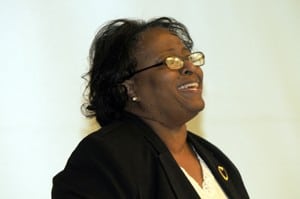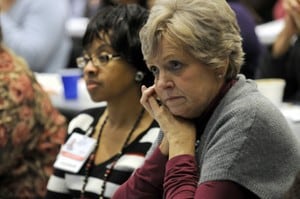Chancellor Calls on Employees to ‘Live the Change’ in King’s Words
Jan. 15, 2010 | UAMS’ institutional core values are built on the same principles of integrity and respect that guided civil rights leader Martin Luther King Jr., UAMS Chancellor Dan Rahn, M.D., told UAMS faculty and staff attending an event marking King’s birthday. Rahn called on employees to “be the change we want to see in the world.” Speaking at the annual Martin Luther King Jr. commemoration at UAMS, the chancellor traced King’s embrace of civil disobedience and nonviolent protest to German theologian Martin Luther and Indian political and spiritual leader Mahatma Gandhi. Those same ideals and moral values, he said, are embodied in UAMS’ code of ethics as health care professionals – honesty, equal treatment, letting patient needs guide health care decisions and the right of the individual to make informed decisions about their health. Click here for the text of the chancellor’s remarks “The values that guided Martin Luther King in his leadership were deeply rooted in Judaism, Christianity and the writings, teaching and practices of Mahatma Gandhi,” Rahn said. “Like him and other great leaders, our moral authority derives from our values and the extent to which our actions are guided by those values.” He cited the influence of Luther in King’s life, starting with the decision by King’s father to change his first name and his son’s from Michael to Martin. Rahn pointed to Martin Luther’s beliefs and challenges to the authority of the Roman Catholic Church that got him excommunicated. Luther went on to make the Bible more accessible by translating it from Latin to German. Rahn noted the influence of Gandhi’s beliefs in mass civil disobedience and total nonviolence in fighting injustice. Said King in 1956: “As I delved deeper into the philosophy of Gandhi, my skepticism concerning the power of love gradually diminished and I came to see for the first time its potency in the area of social reform.” A bright student, King enrolled in college at 15, began working on his doctorate at 22 and by 25 was pastor of the Dexter Avenue Baptist Church in Montgomery, Ala. A year later, in 1955, he organized a public bus boycott following Rosa Parks’ refusal to give up her seat. The boycott lasted until the U.S. Supreme Court ruled segregation on public buses unconstitutional in 1956. Rahn cited King’s famous “Letter from Birmingham Jail” to local clergy who criticized his methods. The letter sums up King’s beliefs in civil disobedience and nonviolence. In the lengthy letter written while jailed for protesting segregationist rules in Birmingham businesses, King drew moral authority from words and deeds of Jesus, Socrates, Martin Luther, Abraham Lincoln and Thomas Jefferson among many others. Rahn noted the fundamental principles in King quotes – an uncompromising commitment to justice and an affirmation of equality for all – are the same principles pledged to by health professionals. The chancellor also noted the UAMS institutional core values – in particular integrity and respect – as echoing King’s lessons. Rahn encouraged learning from King’s legacy by approaching all with honesty, integrity, dignity and respect as well as embracing UAMS’ cultural diversity. Rahn began his remarks asking for a moment of silence for those affected by the devastating Jan. 12 earthquakes in Haiti. The event also featured a stirring a cappella performance of two hymns by Pat Johnson of the UAMS Center for Diversity Affairs. The event was sponsored by the Chancellor’s Diversity Committee.
|


